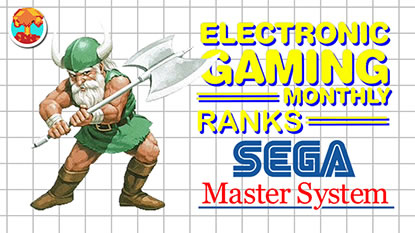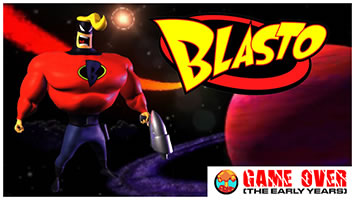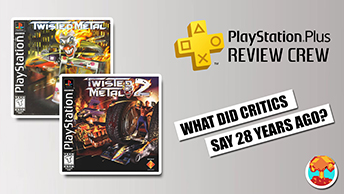- CLASSIC MAGAZINES
- REVIEW CREW
A show recapping what critics thought back
when classic games first came out! - NEXT GENERATION'S BEST & WORST
From the worst 1-star reviews to the best
5-stars can offer, this is Next Generation! - NINTENDO POWER (ARCHIVE)
Experience a variety of shows looking at the
often baffling history of Nintendo Power! - MAGAZINE RETROSPECTIVE
We're looking at the absolutely true history of
some of the most iconic game magazines ever! - SUPER PLAY'S TOP 600
The longest and most ambitious Super NES
countdown on the internet! - THEY SAID WHAT?
Debunking predictions and gossip found
in classic video game magazines! - NEXT GENERATION UNCOVERED
Cyril is back in this spin-off series, featuring the
cover critic review the art of Next Generation! - HARDCORE GAMER MAGAZING (PDF ISSUES)
Download all 36 issues of Hardcore Gamer
Magazine and relive the fun in PDF form!
- REVIEW CREW
- ELECTRONIC GAMING MONTHLY
- ELECTRONIC GAMING MONTHLY RANKS
From Mario to Sonic to Street Fighter, EGM
ranks classic game franchises and consoles! - ELECTRONIC GAMING MONTHLY BEST & WORST
Counting down EGM’s best and worst reviews
going year by year, from 1989 – 2009! - ELECTRONIC GAMING BEST & WORST AWARDS
11-part video series chronicling the ups and
downs of EGM’s Best & Worst Awards!
- ELECTRONIC GAMING MONTHLY RANKS
- GAME HISTORY
- GAME OVER: STORY BREAKDOWNS
Long-running series breaking down game
stories and analyzing their endings! - A BRIEF HISTORY OF GAMING w/ [NAME HERE]
Real history presented in a fun and pithy
format from a variety of game historians! - THE BLACK SHEEP
A series looking back at the black sheep
entries in popular game franchises! - INSTANT EXPERT
Everything you could possibly want to know
about a wide variety of gaming topics! - FREEZE FRAME
When something familiar happens in the games
industry, we're there to take a picture! - I'VE GOT YOUR NUMBER
Learn real video game history through a series
of number-themed episodes, starting at zero! - GREAT MOMENTS IN BAD ACTING
A joyous celebration of some of gaming's
absolute worst voice acting!
- GAME OVER: STORY BREAKDOWNS
- POPULAR SHOWS
- DG NEWS w/ LORNE RISELEY
Newsman Lorne Riseley hosts a regular
series looking at the hottest gaming news! - REVIEW REWIND
Cyril replays a game he reviewed 10+ years
ago to see if he got it right or wrong! - ON-RUNNING FEUDS
Defunct Games' longest-running show, with
editorials, observations and other fun oddities! - DEFUNCT GAMES QUIZ (ARCHIVE)
From online quizzes to game shows, we're
putting your video game knowledge to the test!- QUIZ: ONLINE PASS
Take a weekly quiz to see how well you know
the news and current gaming events! - QUIZ: KNOW THE GAME
One-on-one quiz show where contestants
find out if they actually know classic games! - QUIZ: THE LEADERBOARD
Can you guess the game based on the classic
review? Find out with The Leaderboard!
- QUIZ: ONLINE PASS
- DEFUNCT GAMES VS.
Cyril and the Defunct Games staff isn't afraid
to choose their favorite games and more! - CYRIL READS WORLDS OF POWER
Defunct Games recreates classic game
novelizations through the audio book format!
- DG NEWS w/ LORNE RISELEY
- COMEDY
- GAME EXPECTANCY
How long will your favorite hero live? We crunch
the numbers in this series about dying! - VIDEO GAME ADVICE
Famous game characters answer real personal
advice questions with a humorous slant! - FAKE GAMES: GUERILLA SCRAPBOOK
A long-running series about fake games and
the people who love them (covers included)! - WORST GAME EVER
A contest that attempts to create the worst
video game ever made, complete with covers! - LEVEL 1 STORIES
Literature based on the first stages of some
of your favorite classic video games! - THE COVER CRITIC
One of Defunct Games' earliest shows, Cover
Critic digs up some of the worst box art ever! - COMMERCIAL BREAK
Take a trip through some of the best and
worst video game advertisements of all time! - COMIC BOOK MODS
You've never seen comics like this before.
A curious mix of rewritten video game comics!
- GAME EXPECTANCY
- SERIES ARCHIVE
- NINTENDO SWITCH ONLINE ARCHIVE
A regularly-updated list of every Nintendo
Switch Online release, plus links to review! - PLAYSTATION PLUS CLASSIC ARCHIVE
A comprehensive list of every PlayStation
Plus classic release, including links! - RETRO-BIT PUBLISHING ARCHIVE
A regularly-updated list of every Retro-Bit
game released! - REVIEW MARATHONS w/ ADAM WALLACE
Join critic Adam Wallace as he takes us on a
classic review marathon with different themes!- DEFUNCT GAMES GOLF CLUB
Adam Wallace takes to the links to slice his way
through 72 classic golf game reviews! - 007 IN PIXELS
Adam Wallace takes on the world's greatest spy
as he reviews 15 weeks of James Bond games! - A SALUTE TO VAMPIRES
Adam Wallace is sinking his teeth into a series
covering Castlevania, BloodRayne and more! - CAPCOM'S CURSE
Adam Wallace is celebrating 13 days of Halloween
with a line-up of Capcom's scariest games! - THE FALL OF SUPERMAN
Adam Wallace is a man of steel for playing
some of the absolute worst Superman games! - THE 31 GAMES OF HALLOWEEN
Adam Wallace spends every day of October afraid
as he reviews some of the scariest games ever! - 12 WEEKS OF STAR TREK
Adam Wallace boldly goes where no critic has
gone before in this Star Trek marathon!
- DEFUNCT GAMES GOLF CLUB
- DAYS OF CHRISTMAS (ARCHIVE)
Annual holiday series with themed-episodes
that date all the way back to 2001!- 2015: 30 Ridiculous Retro Rumors
- 2014: 29 Magazines of Christmas
- 2013: 29 Questionable Power-Ups of Christmas
- 2012: 34 Theme Songs of Christmas
- 2011: 32 Game Endings of Christmas
- 2010: 31 Bonus Levels of Christmas
- 2009: 30 Genres of Christmas
- 2008: 29 Controls of Christmas
- 2007: 34 Cliches of Christmas
- 2006: 33 Consoles of Christmas
- 2005: 32 Articles of Christmas
- 2004: 31 Websites of Christmas
- 2003: 29 Issues of Christmas
- 2002: 28 Years of Christmas
- 2001: 33 Days of Christmas
- NINTENDO SWITCH ONLINE ARCHIVE
- REVIEW ARCHIVE
- FULL ARCHIVE
Defunct Games FAQ: Cyril Explains It All
What sells a system: Games, Technology, or Price?
The Problem:
When buying a game system you have to take a few things into consideration. You have to think about the games it plays, and whether or not you can see yourself being satisfied with the selection. Perhaps you're interested in the technology, you like knowing that your system can do the latest and greatest effects. Or maybe you're just interested in the price, you look for the sweet deal and pounce only when it's hot enough. All these things affect system sales, but which of these three affects sales the most?
Not so fast! If that were true then the Sega 32X would have been a much biggest success than the Sega Saturn or PlayStation (two systems that were twice the price). If price mattered so much, then why was the PlayStation 2 selling so well at $80 more? And are there so many people that buy the system the day it comes out, when it's at its most expensive price? The truth is, the biggest factor can't be price, there has to be something bigger than cost alone.
The Technology: A lot of people would think the technology would be the biggest factor, yet I'd argue that it's probably the least important factor of the three. When was the last time the general public made the superior hardware the number one console? Is the Xbox or PS2 doing better in this generation? Or how about the Nintendo 64 vs. the PlayStation. Even the Super NES and Genesis battle was too close to call. So if there's anything we can take from our past, it doesn't pay to be the best system on the block.
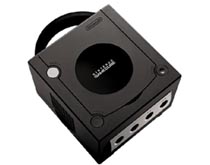
Looking back in our history, it's easy to see that systems sell well when good games are being released, but slump if there's a lull in the quality of titles. The Nintendo 64 posted huge numbers when Mario 64 was released, but didn't do nearly as well when the only titles were Cruis'n USA or Quest 64. This has been demonstrated time and time again through just about every console known to man.
People will do whatever they need to do to get the money to buy a game system if it has the games they are looking for. If a game system doesn't have the games you like and want to play, then it's not going to be a good deal. After all, we are in this industry for the games, not the hardware.

The Solution: I suggest you buy all three systems, and anything else you can get your hands on. I currently own more than 25 game systems, and will have something to play for the rest of my life. Video gaming is an expensive hobby, but it sure beats the heck out of getting fresh air.
Should you pay for Phantasy Star Online?
The Problem:
Should a company be able to add a service fee when they originally priced it as free? That's the argument Phantasy Star Online fans have had to wrestle with for the better part of this generation. Should we be forced to pay to play Phantasy Star Online, a game that isn't even a Massively Multiplayer Online Role-Playing Game? Let's find out.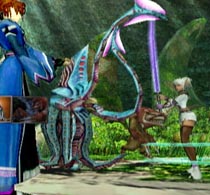
Sensing people were growing bored of the tedium that was the first game, the house of Sonic brought out a semi-sequel that was billed as more of an expansion pack. The only problem was the fact that Sega decided to charge people a monthly fee. It wasn't a lot of money, but it was enough to keep many of the early adopters away.
In the subsequent years would release a GameCube version, again requiring you to pay a monthly fee. The straw that broke the camel's back, though, came from the Xbox version which featured most of the bells and whistles missing from the Dreamcast version. Not only was it a port of a game that was already several years old, but Sega required a monthly fee on top of the Xbox Live fee. This angered a lot of Xbox Live owners, and most of us gamers who want to play the game but don't want to pay for the pleasure.
The Conundrum: There's actually no reason for Sega to charge people to play Phantasy Star Online. Certainly some online RPG's require a monthly fee, but they are usually maintaining a persistent world. Phantasy Star Online doesn't have that problem, since it's really just an action game with an online mode. There aren't thousands of people in a room, only four at a time. So why charge people??
The reason Sega gave in the Dreamcast era was that the servers cost money to keep running, but Microsoft is footing the bill for the Xbox Live, it doesn't seem like a viable reason in the year of 2004. I don't think the chances are good for Sega to reconsider, but as far as I can tell there's no reason for Sega to be charging us extra to play one of the best action/RPG's of all time.

The Solution: Sega needs to get rid of the Pay to Play set-up, everybody should be able to enjoy Phantasy Star Online without the worry of monthly charges. There are other games similar to Phantasy Star Online that don't require a monthly fee, such as the phenomenal Champions of Norrath, so why can't Sega? It makes them look greedy, and feels like a slap in the face to the fans who made the first one so successful. If all online games required you to pay, nobody would be playing SOCOM or Madden 2004.
Should we be making room for new game Systems already?
The Problem:
Now that this generation is nearing the five year mark (assuming you recognize the Dreamcast as the beginning), it's only natural to want to know what comes next. Will the PlayStation 3 have better graphics and sound, and what improvements could Microsoft make to the Xbox to make it better than it is now? And what about Nintendo, they are constantly talking about how their next

The Similarities: It's clear that all three companies, Microsoft, Nintendo and Sony, are all currently working on a next generation game system. I don't think that's any surprise. Chances are they were working on them before this current generation's console shipped. I guess the real question we need to figure out is just how soon they will want to release a system. The only way to do that is to look at the systems individually, and them compare them at the end. So, let's give that a shot, starting with the two systems that have the best reason to see this generation end ...
The Microsoft: The Xbox is one hell of a gaming platform, and we haven't even begun to see what the system is capable of. But there are plenty of reasons Microsoft would want to move on to the next system. For one thing, it would be nice to get the jump on Sony by releasing the system before the PlayStation 3 hits. It would be a complete flip flop of this current generation, and would easily make Microsoft a major player in the video game market.
The problem with that is they would be abandoning their unit after only four years, assuming they release the Xbox Next in 2005. It's a question
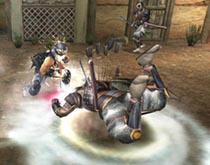
The Nintendo: Although critics (including myself) claimed that Nintendo had painted themselves into a corner by lowering the price to $100, it seems to be working for them. With the retaking of second place (by the thinnest of margins) Nintendo seems to have found their second wind. 2004 promises to be a huge year for the GameCube, while 2005 will bring even more franchise sequels. At this year's E3 Nintendo went as far as to indict the other companies for wanting to get this generation over with. Nintendo seems ready to keep this generation alive, and if there's one thing we know about Big N, it's that they dance to their own music.
Nintendo also plans on releasing a brand new portable game system, the Nintendo DS (tentative title), that will do just about everything ... including play your GameBoy Advance games. But it doesn't look like Nintendo is phasing out the GameBoy Advance, instead they hope that these two systems can co-exist (better than the Virtual Boy and the GameBoy Pocket, one hopes). I have a hunch that this new portable, the continued support of the GameBoy Advance, and a renewed enthusiasm for the GameCube, will all keep Nintendo from releasing a new console in 2005.
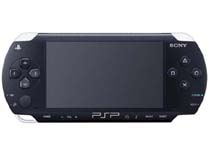
They've laid down the groundwork for what the next PlayStation will have inside of it. And there's no denying that it will be a technologically advanced piece of work. But outside of a few nods and winks, Sony hasn't done much to indicate that they are interested in bringing us a new platform. And I have a hunch they won't until the dust settles over the PlayStation Portable, or PSP, their next generation handheld.
Landing in the United States Spring of 2005, Sony will have to do everything they can to fight off not one, but two different Nintendo portables. It would be unwise, probably foolish, for Sony to release their PlayStation 3 the same year as their portable. One would hope that Sony would want a year or more for people to get used to their first foray into the handheld market, and then give them a new system.

The Solution: Since no new system will be released until late 2005 at the very earliest, you might want to start saving for all the portable systems that will be headed your way in the next 12 months. By the time the PSP is released it might be time to revisit this question, but I still say they won't be releasing any game systems until 2006.
HOME |
CONTACT |
NOW HIRING |
WHAT IS DEFUNCT GAMES? |
NINTENDO SWITCH ONLINE |
RETRO-BIT PUBLISHING
Retro-Bit |
Switch Planet |
The Halcyon Show |
Same Name, Different Game |
Dragnix |
Press the Buttons
Game Zone Online | Hardcore Gamer | The Dreamcast Junkyard | Video Game Blogger
Dr Strife | Games For Lunch | Mondo Cool Cast | Boxed Pixels | Sega CD Universe | Gaming Trend
Game Zone Online | Hardcore Gamer | The Dreamcast Junkyard | Video Game Blogger
Dr Strife | Games For Lunch | Mondo Cool Cast | Boxed Pixels | Sega CD Universe | Gaming Trend
Copyright © 2001-2024 Defunct Games
All rights reserved. All trademarks are properties of their respective owners.
All rights reserved. All trademarks are properties of their respective owners.













